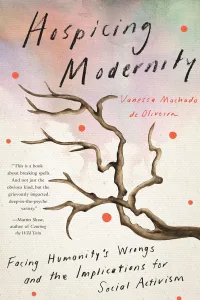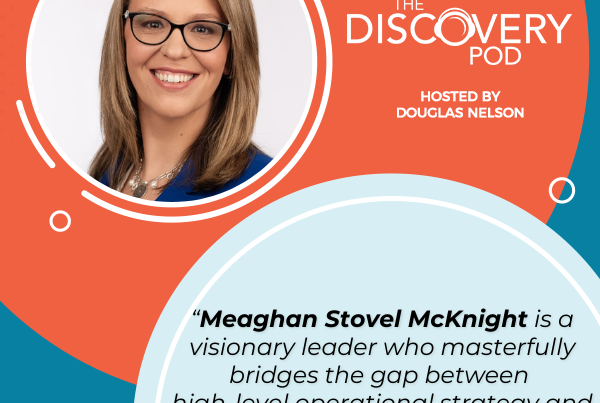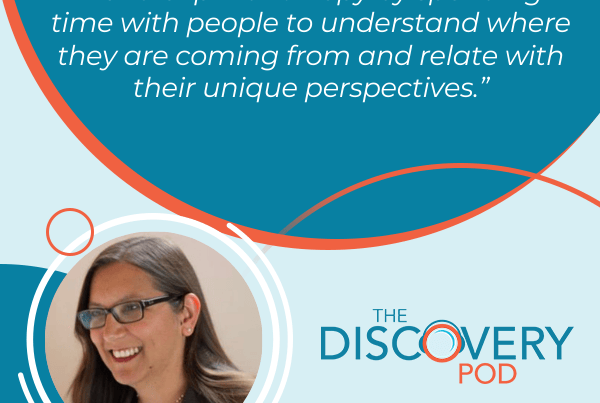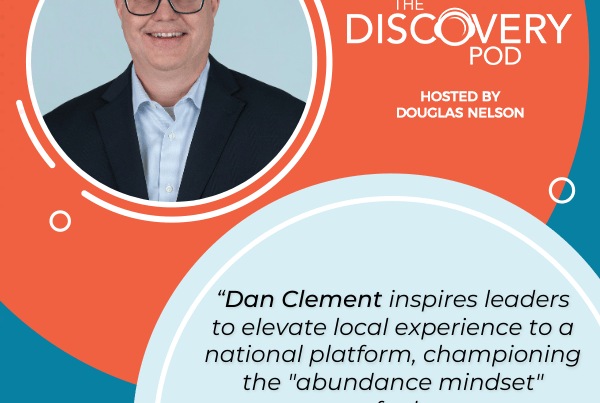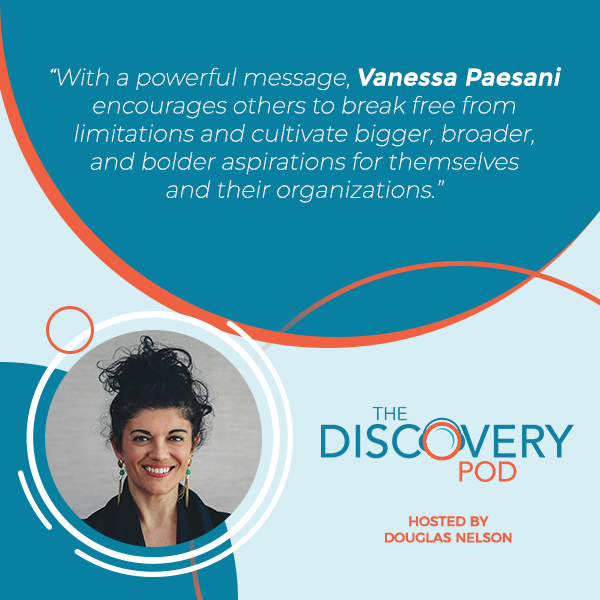
Ready for impact? Journey with us into the heart of the Pond-Deshpande Centre, where groundbreaking ideas ignite real-world change! In this captivating episode, Douglas Nelson sits down with the dynamic Vanessa Paesani, the Pond-Deshpande Centre’s Executive Director, to unravel the powerful connection between innovation, entrepreneurship, and social impact. Prepare to discover how they’re fostering collaboration, sparking systemic shifts, and empowering the very individuals who are shaping a better tomorrow. Get ready for an engaging conversation packed with insights on leadership, resilience, and the incredible power of turning bold visions into lasting impact – you won’t want to miss this!
—
Listen to the podcast here
Pond-Deshpande Centre With Vanessa Paesani, Executive Director
Welcome to the show. My guest is Vanessa Paesani. Vanessa is a recognized leader in social innovation, governance, and system change. She currently serves as the executive director of The Pond-Deshpande Centre at the University of New Brunswick. That organization, that center that she leads, spearheads initiatives that bridge entrepreneurship, social impact, and economic transformation, helping change makers scale initiatives that drive meaningful change.
In our conversation, Vanessa and I talk about what it means to lead change in Atlanta, Canada, building up this new part of the social profit sector in her community and beyond, and what leaders can do to drive meaningful change in their own organizations. Vanessa is a big-time systems thinker with a lot of value to deliver to any leader who’s contemplating or navigating change in their organization. Thank you for reading.
—
Welcome to the show, Vanessa.
Thanks so much for having me.
Inside The Pond-Deshpande Centre’s Mission And Impact
I’m really looking forward to our conversation. You’ve got really interesting perspectives on both our social profit sector and the broader community from your organization. Let’s start out by telling the world, all of our readers, more about The Pond-Deshpande Centre at the University of New Brunswick.
I’d be happy to. The Pond-Deshpande Centre was founded in 2012 with a visionary donation from two entrepreneur-turned-philanthropists, Desh Deshpande. Desh is known throughout the world. Lives in the US. Originally from India. He studied at the University of New Brunswick. He’s been setting up the impact centers, these different institutes and foundations in different areas.
There’s one at UNB, there’s one at Queens, there’s one in Boston, one in India. He always partners with local entrepreneurs. One of our heavy-hitter entrepreneurs in Atlanta, Canada, Gerry Pond, was happy to partner. I’ve been lucky to know Gerry for some time. Both of them came together with this vision of how can we help the business sector in general, be more socially minded to have the heart of the community sector and also teach the community sector, maybe the operational excellence of the private sector.
Over the years, and I’ve been lucky to step into the role to incredible female leaders. We spent some time doing deep social entrepreneurship work. We’ve spent some time doing really deep social innovation work. We’re focused on how do we apply the tools of systems thinking to our most complex problems. As I think we could agree, the world, at least Canada, is in a poly crisis. We just have like big economic issues, healthcare crisis, many things. What we’re trying to do is convene people on these complex issues so that we can come up with solutions that we wouldn’t be able to do when we’re all working in our silos.
Defining A More Just And Equitable Economy
The scope and the scale of the organization and the reach of your ambition. One of the things that got me interested in the center as I was getting ready for our conversation was your focus on a more just economy. How do you define a more just economy?
I’d be curious to hear your thoughts as well. I’ll tell you mine and then maybe you can tell me yours.
I get to ask the questions. You have to have the answers. We’ll go with you first.
That’s what I mean. That’d be great. A more just economy is we’re seeing really like wealth disparities increasing and the rate of inflation is outpacing just like the increase of people’s salaries and things like that. We’ve heard about the declining middle class and things like that. There are all kinds of other trends, too. We have to move toward decarbonizing to becoming more environmentally sustainable.
Actually, I just got back from the UNB internal conference on productivity. As people within the university, as well as some important community stakeholders, we were talking about New Brunswick’s productivity gap and how we fix that. Do we focus just on growing large players, or how do we enable SMEs or small to medium-sized organizations to compete and export more? How do we build more tools of excellence into their toolboxes?
These are obviously very complex issues. If I think about it, we have a productivity gap, we now have the tariff issue with the US. We have these opportunities for environmental sustainability. I would also add that in Canada, we have opportunities for reconciliation with our indigenous communities. How do we put all of these pieces together? That’s complex. Some of the tools that I’ve seen applied that are interesting are the development of impact standards that could serve as the equivalent of what accounting does for money.
We know how to measure money. Money is pretty standardized. We have a common way of understanding it, but we don’t have that for impact, which we need to ensure its credibility. I’ve seen organizations do really interesting outcomes, procurement agreements where instead of just providing grant money, governments are making agreements with community organizations to over five years, create X amount of outcomes for X amount of dollars.
I think that there is a lot more creativity being applied within our financial tools in the way that we’re thinking about the economy. I think that for me, a just economy is where money is the tool. Money isn’t the be-all end-all. Money has always been meant as a tool of trade, a tool to get things done. It’s not how do we not have that just be like the end point? It’s just a tool.
A just economy uses money as a tool, not an end in itself. Money has always been a tool for trade and getting things done. It's simply a tool. Share on XThe pool of gold coins that Scrooge McDuck swims in.
I used to love that show.
Navigating Challenges In Social Impact Leadership
You’re outlining the scope of the entire social profit sector of wealth inequality, equity, diversity, and inclusion, which is going through some challenges as our neighbors to the south are unfortunately course-correcting in a way. You talked about healthcare as well. There are so much such big issues at your center. How do you decide where to put your time and attention? Where do the resources go? When you come into your desk on any given Tuesday morning, where do you get started?
It’s something I’ve been asking myself a lot. We did a strategic plan two years ago now. Our pillars were creating a more inclusive workforce, strengthening civics and democracy, and creating a more just economy. Before I was in this role, the pillar that I was leading was creating a more just economy. The question I’m asking and what sits above that, is it productivity and resilience, or sustainability? They do agree that focus is critically important, and we do have a small team. Even if I think back to the productivity conference I was just at in the university, one of the questions that was asked was, “What is New Brunswick’s focus? What are our priority sectors?”
I think that this destabilization that we’re experiencing is allowing us to ask ourselves now. Now, what are the priority or focus areas? They might be slightly different than they were before. One person on the panel suggested that this conversation that we just had on productivity was relevant before, but now it’s dire. We cannot wait to figure this out. Sometimes I wonder if the universe invites us to solve these things, and then if we don’t quite figure it out fast enough, it forces us to figure it out. I think maybe we’re there.
Destabilization allows us to ask ourselves what our priority or focus areas are. Share on XI think it’s those silver lining problems, like where is the opportunity in this period of destabilization? I like how you characterize that. The opportunity is really in focus. We’re seeing that a lot in our sector. The organizations that have been most resilient over the last five years have been the ones that have been even with broad mandates, been very narrowly focused on how they’re going to execute against those mandates. That has a lot of characteristics for social enterprise as well, to being able to point everything in the same direction gets you a lot further than taking a very scattered approach.
Focusing On Impact Beyond Profit And Nonprofit Models
Again, going back to how the center is positioned, because I think you occupy a valuable space and a really important place for conversation. You talk about not paying attention so much to the economy or the toggle switch of social profit or for profit but focusing on impact. Can you tell us a little bit more about what that focus on impact is and maybe give us a couple of examples along the way?
For a number of years, I was consulting to the center, and I did other consulting projects in the community sector. I was always struck by the language of nonprofits and for-profits. Even just the word nonprofit, already frames what we’re doing in a deficit position.
Self-definition isn’t healthy in a teenager or a major sector of our economy.
That is so good. I love that you said that. I’m going to use that. It was always like, how do we frame this as a community center impact sector? I call it the community sector. Even in a nonprofit, like I’m sure I always use the word surplus because we’re not making a profit, but it’s okay for us to make surplus that allows us to make different kinds of decisions that we could if we didn’t have surplus.
Over the last couple of years, I’ve come to realize that the stories that we tell ourselves, our mental models, and we see this a lot in systems thinking. That whole iceberg and at the bottom or very deep below the surface of the water is our mental model. How do we use those mental models to reshape what’s possible in the social profit or community sector, the for-profit sector. I know that there’s no real alignment yet on what is social enterprise or social impact ventures.
It means different things depending on who you talk to, which to your earlier point, too. I think it also gives us the opportunity to continue to professionalize this sector and make it the real alternative to like “I’m growing for growth’s sake.” That’s the only thing that matters. It doesn’t matter if I destroy the environment or I exploit people or I create deficit positions in other countries or whatever it is. Those things need to matter.
The invitation is for us to realize that we’re all interconnected. If I win, you win. If you win, I win. How do we do that in a practical way? We have to get out of our fear-based responses. That’s not easy, especially in a destabilized time, such as we’re in. I do think that we have to respond out of opportunity and compassion and not out of fear.

Pond-Deshpande Centre: If I win, you win. If you win, I win. The invitation is to realize we are all interconnected.
That’s really good advice. You mentioned social impact investing. I want to push on that a little bit or go into that a little bit. We worked with a number of community foundations across the country in our work with clients. Each organization is taking a very distinctive and unique path to what social impact investing looks like as a part of their portfolio. The commitments that organizations are making to it are as high as 100% of their funds under management and as low as five. It works if you can invent your own definition of what social impact investing means. With you and your colleagues at PDC, how do you approach or define social impact investing?
I have been following the development of the Social Finance Fund. I did sit on the Canadian Women’s Foundation Investment Readiness Committee, where we disbursed two million to women serving women-led organizations across the country that were doing social enterprise and exploring social finance. This is why I go back to the just economy. What is the vision of the future that we’re moving towards?
I don’t miss a major trend that’s happening, and how does AI enable that? We’re so afraid that AI is going to take our jobs, but AI doesn’t have to take our jobs. It can enable us to do so much more. I think the question is how we envision this future. How do we develop the tools to get there? With social impact, investing is the tool to get there. It’s not like we have to ask ourselves, “What is the tool for?”
AI doesn't have to take over our jobs. It can enable us to do so much more. The question is: How do we envision this future, and how do we develop the tools to get there? Share on XBreaking Barriers In Social Impact Investing
I cannot tell you how much I appreciate that approach. We talk about strategic plans being tools and campaign plans being tools, not just documents. I’m curious what your advice would be to a leader of a social profit member or social profit or even a board member of a social profit. It’s considering moving into these social impact investments. How do they get started? What we’re seeing is the concept gets some good conversation and then a yes, relatively easy yes. The first investment comes, and people say, “That’s not a high enough return, or no, that’s not local enough.” It’s very hard to get that first yes on the first social impact investment. What advice would you have for a board member who’s got that first proposal in front of her?
It’s the question that we’re asking ourselves globally. It’s like, are we still going to do growth for growth’s sake, or are we doing growth with this vision of the future in mind? I’m going to go back to something that you said, which is the organizations that are the most resilient. They’ve chosen a focus. They’re just figuring out the pathway to create that desired future. It becomes, this isn’t easy, of course, it’s how do we agree that this is where we’re going?
We’ll just have to figure out the tools and maybe this one thing in our hypothesis. It didn’t look exactly like it we thought it would, but how do you then go back to the hypothesis of like, “Do we need it to if it’s at five?” We thought it was going to be a 10% return. Are there other places we can juggle that? There is a reality of needing to balance books, and needing to do all of that is real. It’s really what direction we are growing in. What tools are we okay with? What trade-offs are we willing to make?
It’s something that I’ve seen a number of organizations, with very good intentions, really struggle to get that first yes when it comes to social impact investing. Part of it is the assumption that it automatically means that it’ll be a lower return. It’s not necessarily the case. Even if you can get a higher return investing in something that is counter to your organizational purpose, is that helping your organization? There are, as you say, a lot of things to balance.
What have you seen that works well in that case? When people are making that trade-off decision, what has worked well?
The smaller decisions out of the gate. Something that is in the low to mid six figures versus something that’s in the mid seven figures. It’s something to measure. People want to experiment, or board members are open to experimenting. I think the professional staff, in most cases, is more than ready. They’re well down the line and trying to bring the board along. It’s giving people who fundamentally agree with the direction permission to say yes to something and do one, and then the next meeting or the next time they’re do 2 or 3.
Build up the flow, build up the motion, and get people used to saying yes and asking good questions about whether this is a good social impact investing rather than asking the question, should we do impact investing? Moving past that question as quickly as possible, tangible results, tangible things to say yes to. I cannot tell you, Vanessa, how much easier it is to say that than to do that.
Right? I know. Exactly, yeah.
That rolled off like, “You have to do, but I’ve worked with a number of clients who have had the big idea project ready to go out of the gate.” It’s been a real challenge to get board members who agree with them to be able to say yes. What has worked in those cases is brilliant leaders in those community foundations putting together a package of incremental steps, incrementally increasing the size of the projects people are already saying yes to. It just changes the dial on the board table over time.
That’s great advice because even if you think about physical activity, like no one’s going to start and say, “You don’t start from never running to running a marathon. You would do a 5k or 10k, a half marathon.” There’s news. We’re used to the gig that way with our bodies. It’s like, how do we translate that to these like a bit more ethereal concepts? It’s important.
The Role Of PDC In Convening Social Enterprises
I like that analogy. One of the other things that the PDC does, that I’m interested in hearing because it’s something we’re seeing right across the country, is an increasing role for the convening agents. Those organizations are bringing together fellow travelers around a cause or around a project or a social issue. The social enterprise sector, because it is amoebic at this point, is not anemic.
My first degree is in biology, so I get that.
To put your arms around, and it’s changing shape quite quickly. What is the role of the PDC in convening that social enterprise sector in New Brunswick?
Social enterprise? Yeah. We are focused on convening in general on complex problems, including social enterprise. We have been stewarding the social enterprise sector for the last couple of years. About ten years ago, there was a movement across Canada for provincial governments to adopt social enterprise strategies. They looked a little bit different in each province. New Brunswick never got ours over the line.
The other thing that’s happening in New Brunswick is that we also don’t have a nonprofit association, which most incorporated jurisdictions do. This means that there’s no way for social enterprises to find each other, and they don’t know, and the government wants to be like, “How do we help? How do we hear what the needs are and then develop good products that social enterprise will use and want and these types of things?”
We’ve been trying to act as a convener. We’ve been running a project called Social Enterprise in Brunswick. We’re working with EY here in St. John to produce a report where we’ve looked at the state of the social enterprise sector in 2019 compared to now, asking ourselves like, “What are the needs now? We’re also looking to Quebec as the model because Quebec has the Chantier de l’économie sociale, which has helped like convene their social enterprise sector, develop different products that are available to the sector, and these types of things so that they’re able to have a voice.
We’re looking to that as the model and then asking, “What are the needs? How do we shape this?” Working with partners at our sister university, just up campus called St. Thomas, I just hired their first prof in nonprofit management and social enterprise. We’re co-located at the School of Leadership Studies. There’s an organization in the neighboring city Moncton.
They’re launching soon the Community Incubator, which partnered with the Universite de Moncton to provide studies on social enterprise and money. There feels like there’s this exciting locus of activity. To your point, like, the role of convening is really important because people that are finding us and like, when I type social enterprise. At least something comes up, and then they can call me and be like, “Who I need to talk to.”
There’s an exciting locus of activity right now in social enterprise, and the role of convening is critical to making meaningful progress. Share on XI can help them wayfine because there’s no real way for them to wayfine. We’re trying to act as the conveners, and we had a social enterprise conference in the fall. We’re hoping to do the same again this year. I think there’s just like super exciting trends, and we’re excited to be the convener because I think that that convening role is important.
In times of destabilization, to use your phrase, there is such an important place for sharing time and space together and those organizations and those centers that can pull people together to have conversations about shared issues or shared potential are a source of tremendous hope and meaningful change, whether it’s incremental or transformative or ultimately transformative, that shared space is critical.
I agree.
Looking Ahead: Vanessa Paesani On The Future
Vanessa, as we come to the end of our conversation, I get to ask you my favorite question that I get to ask all of our guests. What are you looking forward to?
I’m looking forward to considering how we use this time of destabilization to move towards a better future. I’m a big reader, doing a lot of reading and been following Ray Dalio in the US, who has been profiling the macroeconomics of what’s happening now, which he would call we’re at the end of a major cycle. Generally, when that happens, there are a lot of opportunities for big change. I’ve also read a book called Hospicing Modernity from an academic NBC, Vanessa Machado de Oliveira.
She’s amazing. I’ve seen her talk several times. It’s not uplifting, but it is brilliant.
Her take is really important in these times, too, because it’s worth potentially coming to the end of this macro cycle, which is hard to see in our day-to-day lives. How do we intentionally agree on that? That’s an important part of what we need to do. The last book I want to mention that I’ve been thinking a lot about in all of this is a book from a couple of Indigenous authors in the US called Restoring the Kinship Worldview.
They profile 40 different common dominant worldviews that we have right now. They also propose Indigenous worldviews. It’s presented at a table, and they acknowledge they’re like, “This is obviously not a binary. All of these worldviews exist on a continuum.” I’m excited by the potential of all of these major shifts, creating these opportunities for us to be intentional about what’s next. What are the common worldviews that we’re operating in now?
How do we want to shift them? I’m excited to have this conversation with you because I know you’re thinking a lot about the social profit sector as well and really like how do we create like maybe merge social and profit, which used to exist separately. It’s like, how do we move those forward together? Maybe I could ask you a closing question, like what is your view of the just economy, and what is our biggest opportunity?
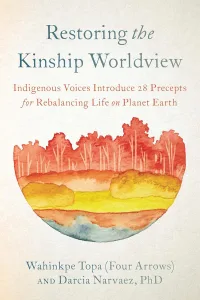
Restoring the Kinship Worldview: Indigenous Voices Introduce 28 Precepts for Rebalancing Life on Planet Earth
There are two things that I’m particularly excited about and spending a lot of time thinking about and acting to help make happen. One is that broader view of what the social profit sector is and its role in our communities and in our society. The best ideas and many of the best people are in our sector, and constraints perceived or otherwise that we have on our sector and organizations in our sector work against those brilliant people doing that community-changing, society-changing work.
It’s telling bigger stories, taking bigger actions. That always starts with the first step. That doesn’t go too far down the road, keeps our feet and our eyes on a relatively the same trajectory as we’re moving forward. The second is that the leadership in our sector is changing who is leading these organizations is far more diverse.
It is far more women are leading large social profit organizations than they were even five years ago back to silver linings. One of the changes through the time of the virus was that a lot of older leaders left the sector, many of them who did great things during their career. What was left were some really engaging, challenging leadership positions for a new generation and a new style of leader.
That’s part of what we try to do with the podcast is who are we talking to that’s doing things differently, that’s telling a different story, that’s bringing a different perspective. What we see in our work as consultants is that the organizations that do have that broader, more diverse perspective are the ones that are more resilient. They are more robust. They are making more progress toward their purpose. We want more and more of that.
I love the point about the bolder, bigger visions and things like that. One of our values at the center is boldness. That came up at the university conference on productivity. It’s the question, how can New Brunswick be more bold? How can the university be more bold? How can The Pond-Deshpande Centre be more bold? How can I, as an individual, be more bold? I’m reading a master’s thesis on presence in master certified coaches.
People that have really spent time, like going deep in themselves. One of the quotes I’ve been pondering a lot is that the change anyone’s able to create depends on their interior conditions. I have to expand myself, and I have to tell myself bigger stories of what’s possible in order to be able to go and create that. Having these types of conversations is helpful for me, too, because I can start to think more broadly and more deeply. Thank you.
I hope everybody that’s read takes from your comments and from your advice, having a bigger, broader, bolder vision of what’s possible for themselves and their organizations.
Thanks for your time. Nice to talk to you.
Thanks for being on the show.

